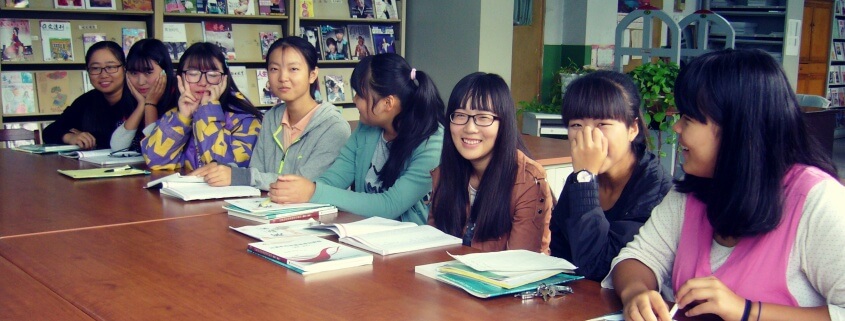Grateful Volunteer Says: “I’ll Remember You Forever”
Marilyn has served in three different service programs. Here she speaks about the experience of teaching English in three countries.
The eyes are equally expectant, although the faces are different. Silent, shy, and incredibly polite college freshman in Xian, China; raucous, rambunctious and never quiet high school seniors in Ostuni, Italy; and respectful, mature adults in a social service center in Siedelce, Poland: all wanting to improve their English language skills, and all looking to me to help. With the assistance of bi-lingual dictionaries, imagination, a sense of humor, black-boards and chalk, support from other team members, and Global Volunteers assurance that “yes, you can do it, ” I actually did it – in all three places. Teaching English in three countries was not easy, but it was a wonderful experience.
Nervousness escalated to anxiety on the day I learned my first teaching experience was to be four classes of Chinese college freshmen, fifty students in each class, and no Chinese teacher in the room with us. A day of orientation had not helped me prepare for the first day of class. I talked to other team members and prowled the resource room. I don’t know if it was intuition or desperation which made me choose Dr. Seuss’ “Cat in the Hat” to take to class that first day. I wrote the first paragraph on the board and read it. In unison, the class repeated it. I walked up and down the aisles, reading, showing pictures, correcting pronunciation as I asked hesitant, nervous students to read after me. Dr. Seuss was a hit! Their voices were soft, their demeanor restrained. Accustomed to rote repetition and speaking in unison, the challenge was to get them to speak English individually. I prefer not to call on students, so I had to teach them to volunteer: “Raise your hand; raise it high so I can see it.” Practice in hand raising (“Elbows above the ear!”) and even waving, became a daily exercise.
My China experience didn’t fully prepare me for 17 – 18 year old Italian High School Seniors I met on my next Global Volunteers adventure. They too rarely raised their hands: they just talked without asking! And talked! Sometimes to me, sometimes to their neighbor, sometimes to the student across the room. They reminded me of my own children and their friends. In Italy I learned that the participation by the host teacher as well as the age of the students and their existing English language skills varies between countries as well as within each country. I always asked to work with older students, but in Italy as well as China (and later in Poland) other team members delighted in the warmth and enthusiasm of younger children.
In the Ostuni high school, volunteers were asked to assist the classroom teachers, but not to plan the lessons. On a typical day I would discuss the United Nations, the War in Kosovo or American history with a group of 8 to 12 students. I corrected grammar and pronunciation, suggested idioms and vocabulary and answered their questions about the life of American teenagers.
Unemployed adults were my “audience” in Poland, where I was once again alone in the classroom. Although several of the 11 students in my two classes were in college or had college degrees, their English skills varied. The program in Siedelce is structured and based on many years of Global Volunteers participation in the community. There is a very well stocked library of teaching aids, and textbooks are adopted for each class. But teaching and learning are individual; I search for materials and methods which are effective for the needs of my students, but the methods chosen have to feel congenial to me. I decided the best use of my three weeks in Poland, as it had been in China, was to get the students to talk, talk, talk. Correct pronunciation, build simple sentences, make up conversations. Do it individually, do it in small groups, but do it out loud.
We read “Green Eggs and Ham” and “The Little Red Hen”; acted out shopping trips and employment interviews. I gave them children’s alphabet blocks and boggle cubes to make simple words; index cards with simple words to combine into sentences. I talked about American history and read an essay on peanut butter (try finding that in a small Polish-English dictionary). I rarely used the suggested text which assumed more knowledge of English grammar than I possess. My colleague teaching next door asked: “Why do your students laugh so much?” I have always found studying languages as dull as it is difficult, so I take every opportunity for humor. Whenever things get really dreary, I look up a word in my dictionary and try to pronounce it — always good for a laugh — in Poland as well as China!
Experiences beyond the classroom add to the richness of each global volunteers assignment. Weekday afternoons in Ostuni we wandered winding cobblestone streets so narrow that pedestrians flatten themselves against the walls so cars can pass. The newer sections of Ostuni are modern; Old Ostuni is the old Italy of picture books. In Poland, relaxing in rattan chairs on the back porch of a 19th century country manor house, we watched woodcarvers making giant statues to be donated to a local orphanage or listened to competition-winning young pianists. Poland’s Reymontowka — the House of Artistic Worth — hosts meetings, conferences, picnics and performances, as well as Global Volunteer teams. We heard the Siedelce City Chorus, and their military band; were enthralled by the Grandmothers and Granddaughters group singing traditional Polish songs, and by the energy, stamina and creativeness of young gymnasts.
But Xian, with its museums, temples, pagodas, lively street life, and modern shopping malls is special. Red and gold paper lanterns lighting streets lined with low tables and small stools where people are eating their evening meals; ponchos in bright red, green, yellow and purple covering hundreds of bicyclists waiting in the rain for a traffic light to change; markets with candy in garish gold and green wrappers, live fish swimming in pails of water, foot-long radishes and hundreds of varieties of greens, beans, seeds and spices; young people stopping me on the street asking to practice their English; a multi-course lunch (featuring a thousand dumplings!) with a student’s family in their home in a modern apartment complex.
Not knowing Chinese is not an obstacle to exploring and enjoying Xian. Global Volunteers provides a fail-safe Chinese-English list of key words and major sites. Body language, pointing, smiling, and the patience and good humor of the Chinese people take care of the rest. Trying to buy a pair of pants in a department store, when “mas grande” didn’t work I pointed to my more-than-ample hips; the clerk laughed and found a larger size. In a noodle shop without an English menu, I pointed to items being eaten by other patrons. Shaking the empty thermos told the hotel staff we needed more hot water; the motion which finally communicated more toilet paper need not be repeated.
Teaching English in three countries brought different experiences. Each was distinct and each was rewarding. But the lessons I learned in one country – about myself, about teaching, about interacting with students, about being part of a team – helped me in the other countries. Similarities outnumber differences. The host teachers – so happy to have you – are appreciative, warm and supportive, team members constantly help and praise each other, and the students love you. Teaching with Global Volunteers is a constant massage to the ego.
“I am a silent boy, ” wrote Kioung Junchoo on the last day of class in Xian. “I don’t answer the questions before, but you asked me. I was very surprised. When I answered you gave me courage, so I was very glad. Since then, I tried my best. I want to say to you ‘Thank you’. I will remember you forever. ”
I will remember him forever.





Leave a Reply
Want to join the discussion?Feel free to contribute!